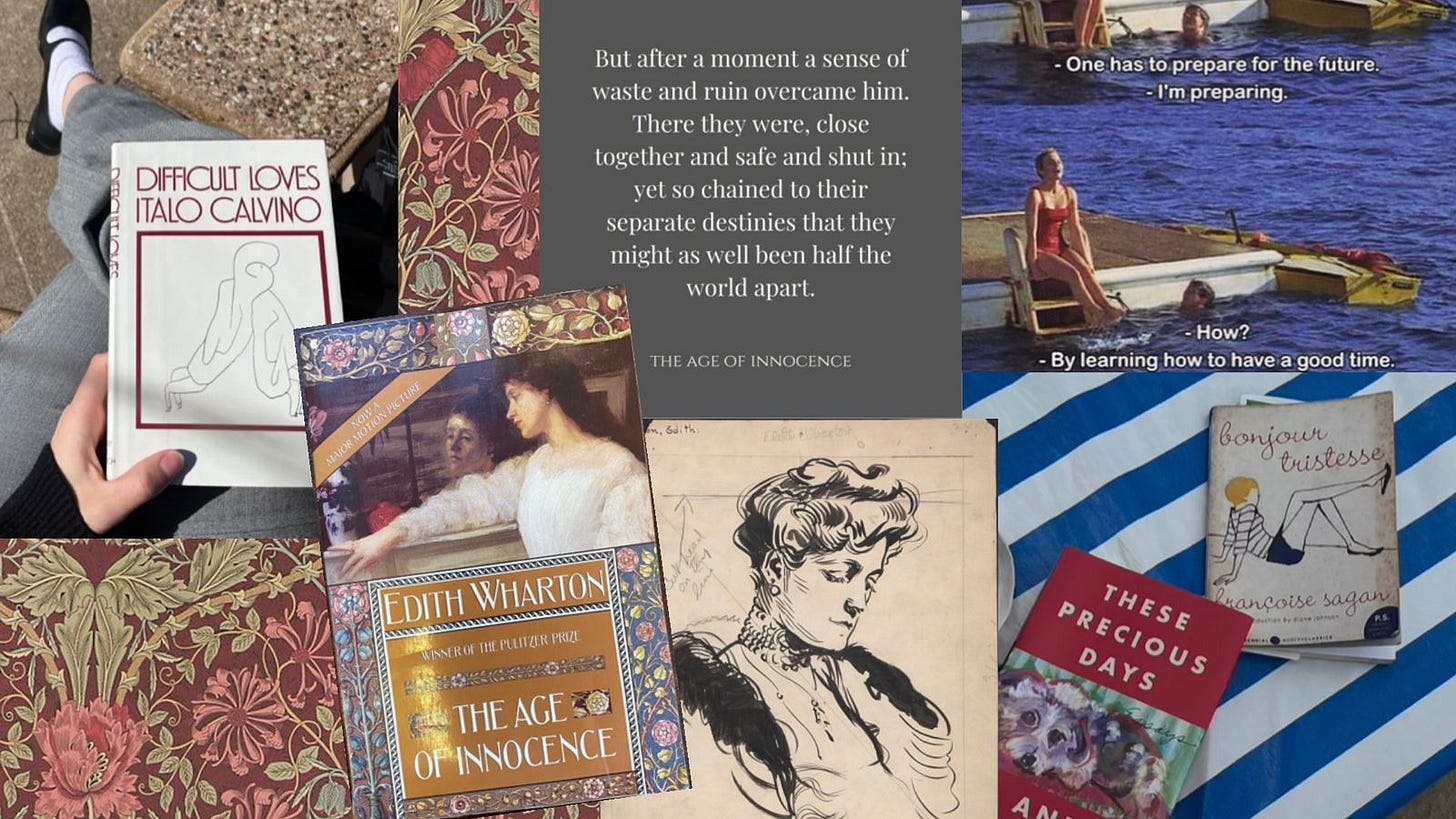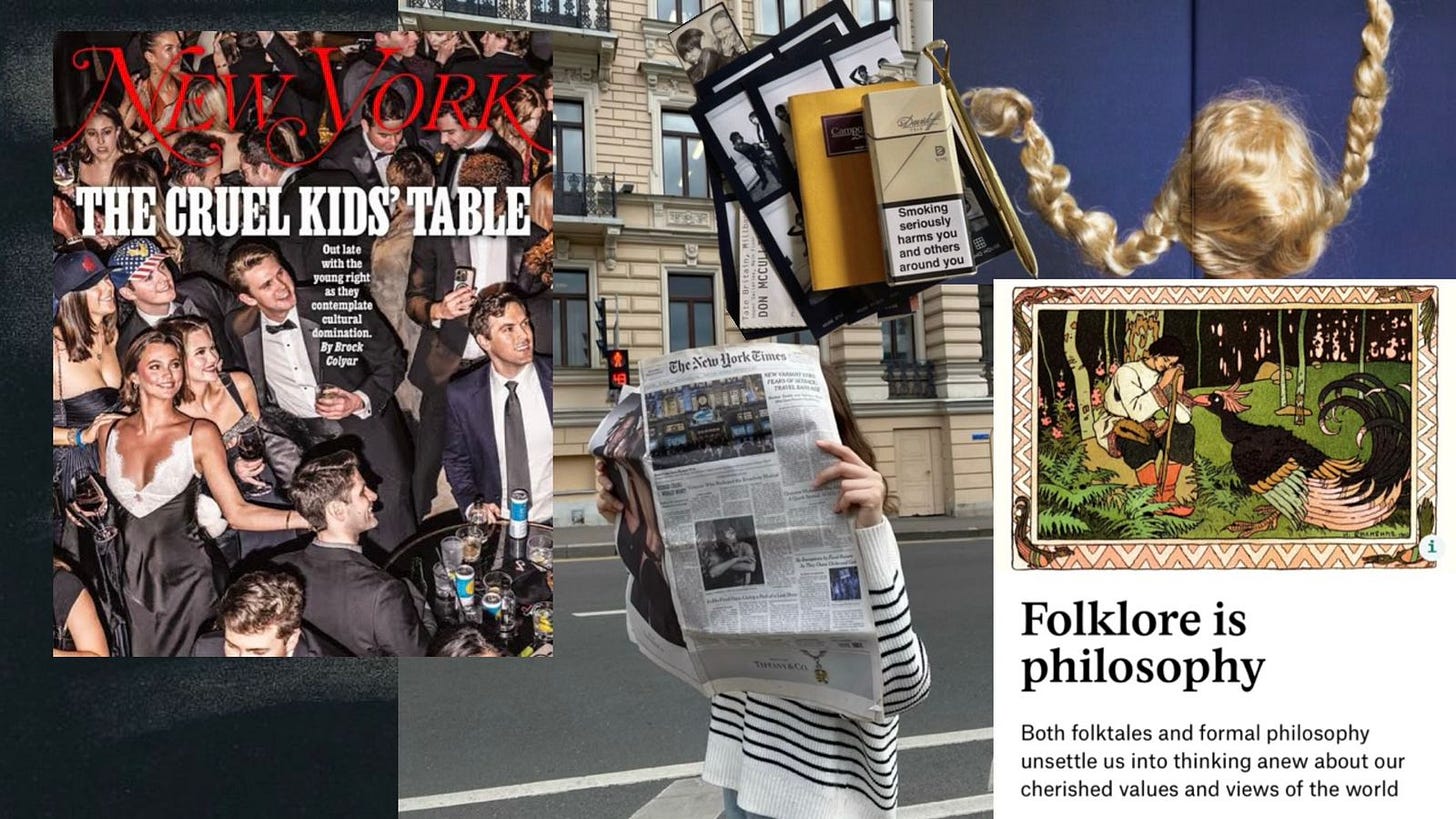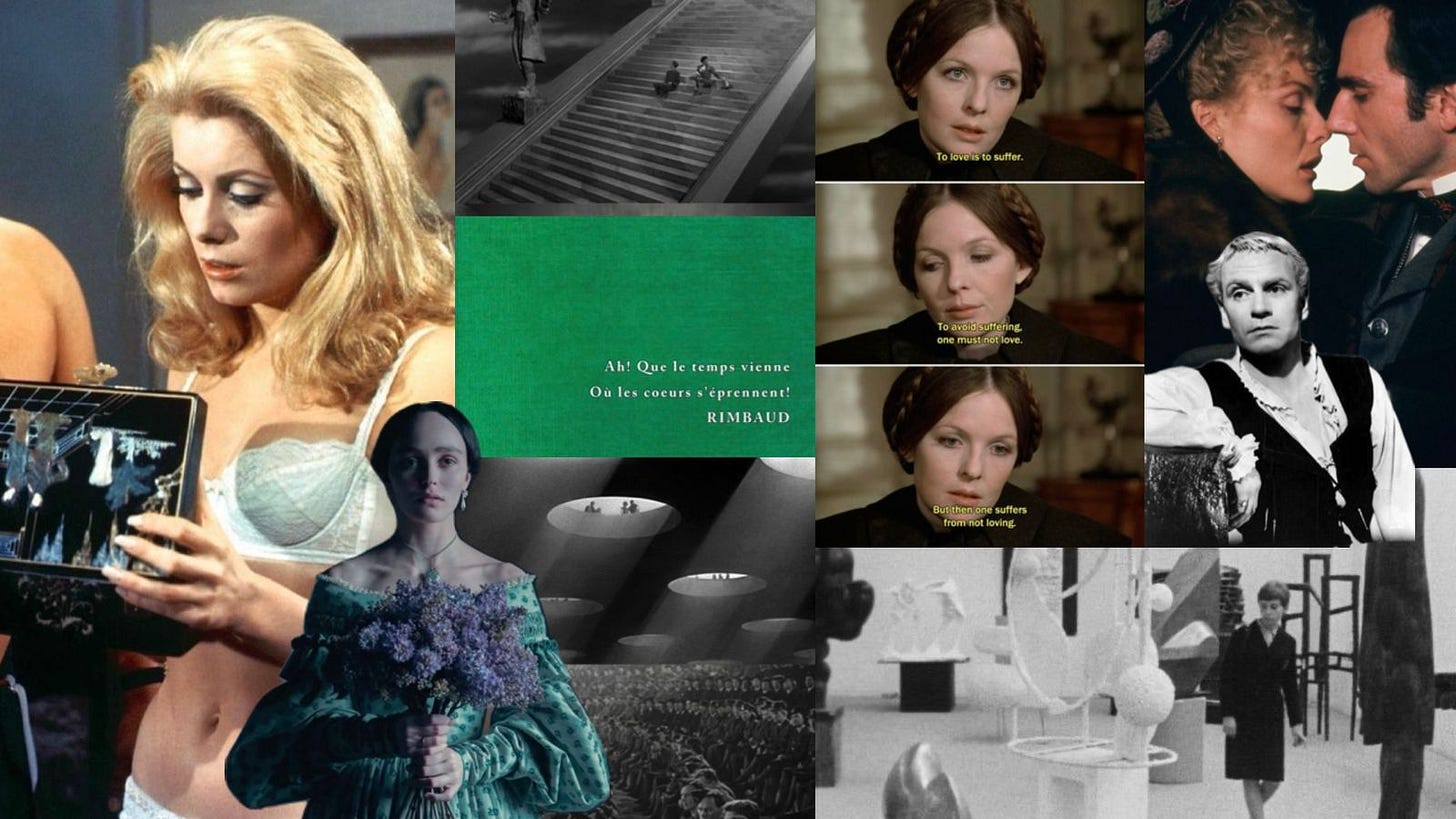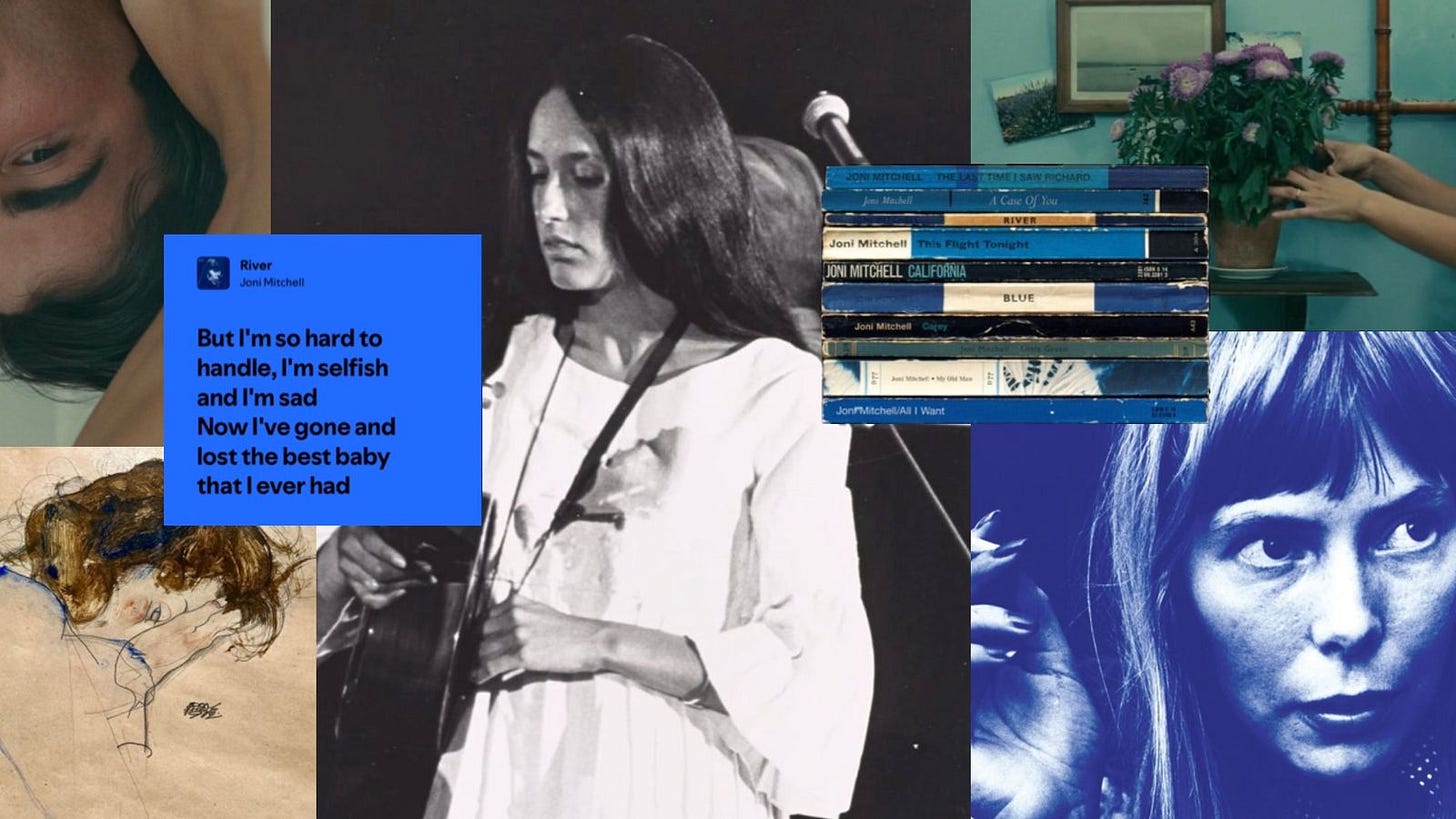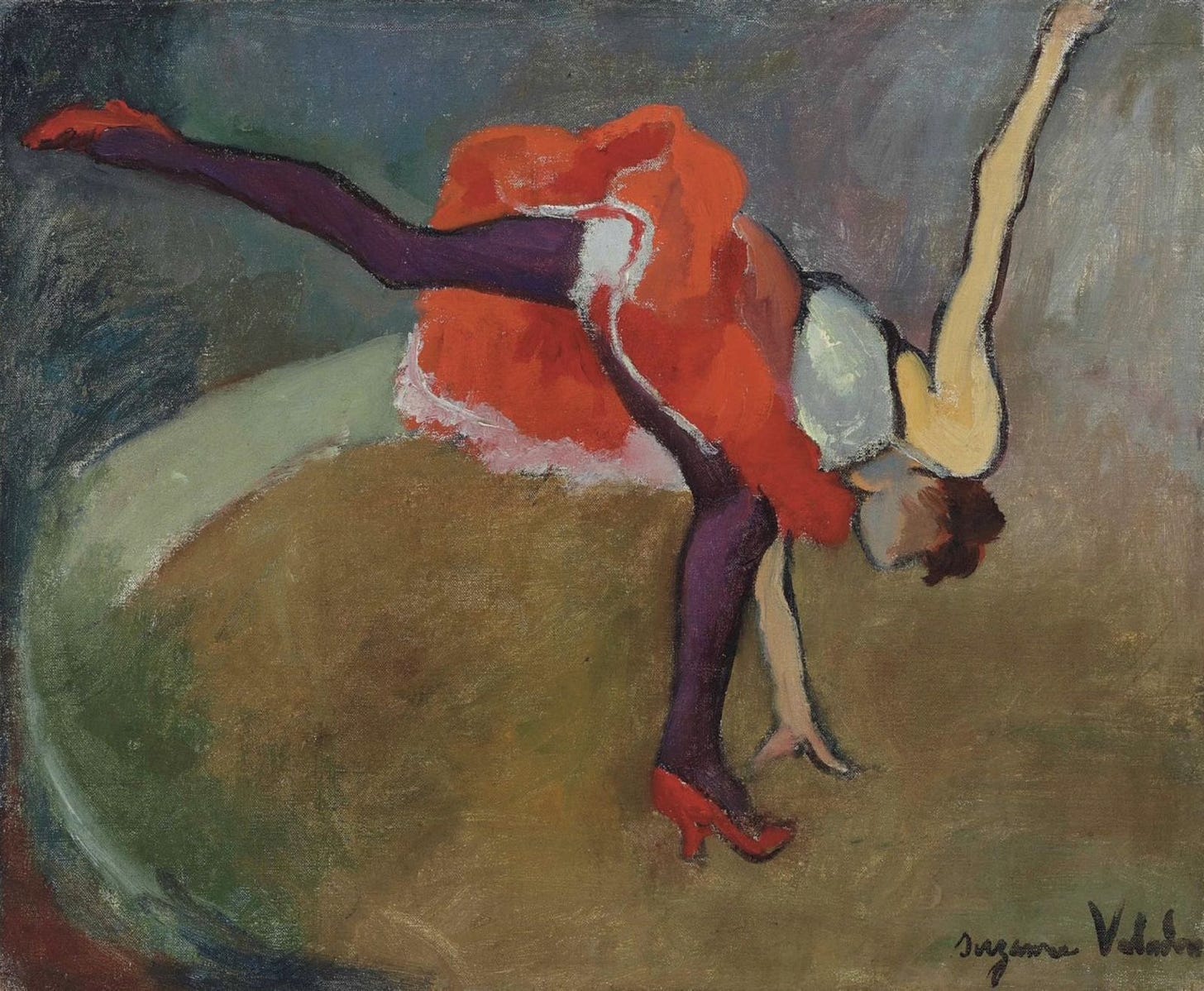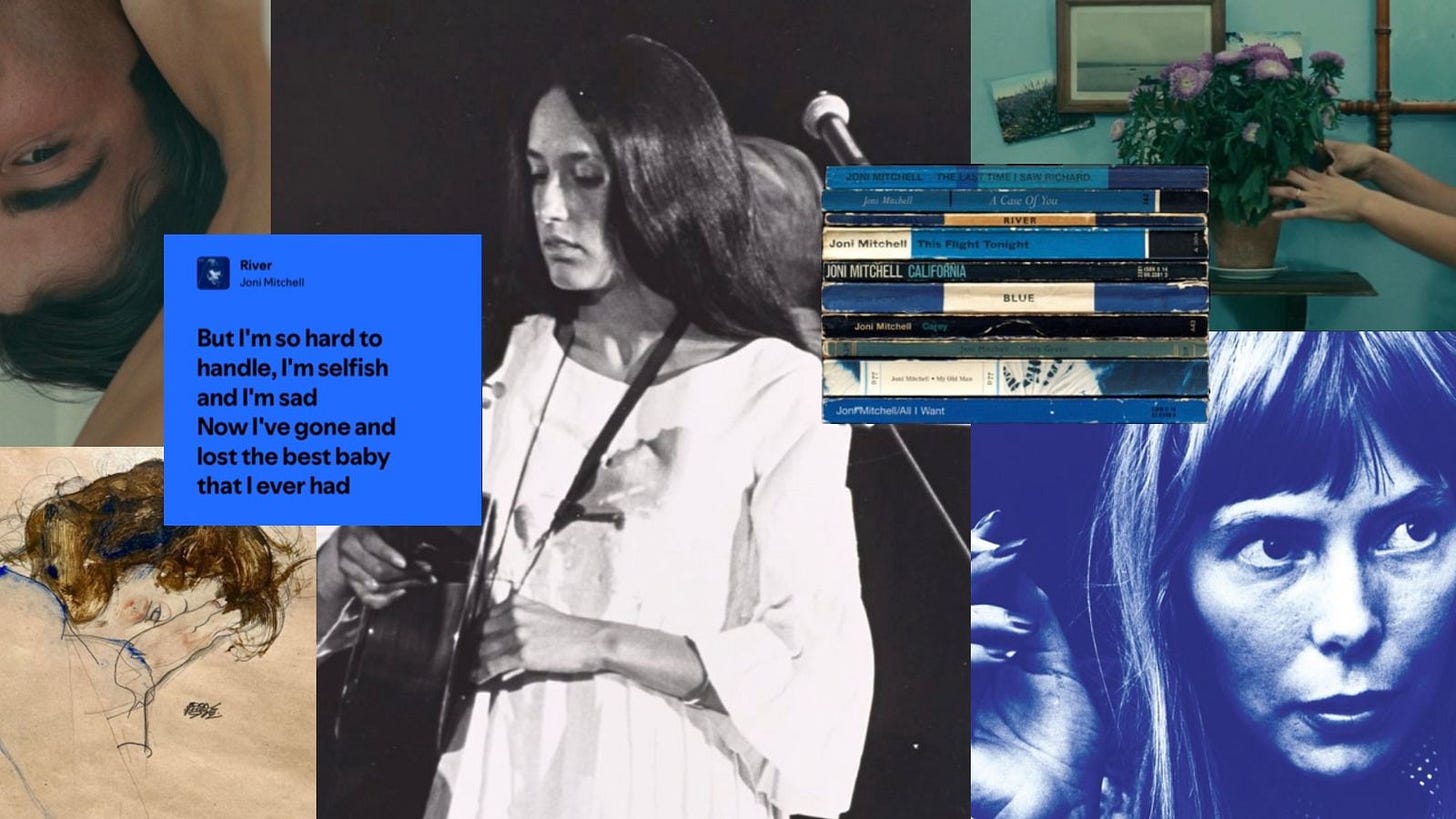Methought - January/2025
Monthly wrap-up: stories of Old New York, my first Calvino book, a disturbing portrait of conservative youth, the best Hamlet I've ever seen, reflections on feminine desire with Buñel and Joni & Joan.
scroll down to read the English version
Caros Leitores,
Tive um ótimo começo de ano, em vários sentidos. Literariamente (que é o que importa para vocês) recuperei o brilho no olhar depois de finalmente ler um livro incrível, vulgo The Age of Innocence. 2024 foi um ano de boas leituras muito isoladas num mar de obras medianas. Estou determinada a mudar isso esse ano, vamos ver se vou conseguir.
Talvez você tenha me visto falar aqui ou no instagram da minha meta de ler mais filosofia em 2025, e no momento estou terminando A República de Platão enquanto que Assim Falou Zarathustra de Nietzsche está pausado. Como ainda não terminei nenhum dos dois, provavelmente os comentários virão no Methought de Fevereiro (aguardem!).
Ultimamente tenho gostado de ler os poetas da New York School (comecei com meu querido Frank O’Hara, obviamente, e fui descobrindo outros) e lembrei desse poema que, para mim, retrata bem meu sentimento de comecei-o-ano-e-voltei-a-mesma-rotina:
Poem (The day gets slowly started)
By James Schuyler
The day gets slowly started.
A rap at the bedroom door,
bitter coffee, hot cereal, juice
the color of sun which
isn’t out this morning. A
cool shower, a shave, soothing
Noxzema for razor burn. A bed
is made. The paper doesn’t come
until twelve or one. A gray shine
out the windows. “No one
leaves the building until
those scissors are returned.”
It’s that kind of a place.
Nonetheless, I’ve seen worse.
The worried gray is melting
into sunlight. I wish I’d
brought my book of enlightening
literary essays. I wish it
were lunch time. I wish I had
an appetite. The day agrees
with me better than it did, or,
better, I agree with it. I’ll
slide down a sunslip yet, this
crass September morning.
LIVROS &TC
Bonjour Tristesse - Françoise Sagan (1954)
O que parece, à primeira vista, uma leitura despretensiosa de verão é, na realidade, um retrato afiado do egoísmo e da vaidade nas relações humanas; Françoise Sagan me surpreendeu com a precisão de suas observações psicológicas. Em Bonjour Tristesse, acompanhamos Cécile, uma jovem de 17 anos que leva uma vida boêmia ao lado do pai – um verdadeiro Roger Sterling francês –, até que Anne, uma amiga da falecida mãe, surge para colocar ordem nesse oásis hedonista da Riviera e, de brinde, assume o papel de madrasta. Mas não se enganem pois isso não é uma história de Cinderela.
A prosa elegante de Sagan captura a introspecção de personagens autocentrados sem recorrer a simplificações ou vilanizações fáceis. O trio – Cécile, Anne e Raymond – ganha vida em um jogo sutil de egos e manipulações. Escrever personagens tão imperfeitos sem ceder à tentação de redimi-los ou presenteá-los com uma epifania é um feito raro. Não direi se há redenção ou não, mas posso garantir que adorei o desfecho, que foge do convencional. Existe um filme baseado no livro, mas meu sonho seria ver Bonjour Tristesse adaptado por Rohmer.
A Época da Inocência - Edith Wharton (1920)
Esse livro é excelente e tenho certeza que entrará para os favoritos de 2025. Desde que terminei de ler A Época da Inocência, há duas semanas atrás, não consegui iniciar outro romance pois vai ser difícil me apegar a outra história quando essa ainda ecoa na minha cabeça.
Eu juro para vocês que tudo que li nessas duas semanas me fez pensar em Newland e suas hesitações (por exemplo, reli The Lovesong of Alfred J. Prufrock ontem e pensei Newland.) Mas que grande personagem principal, um trágico herói patético que nos faz torcer e ter raiva ao mesmo tempo. Newland passa a vida culpando a sociedade por sua resignação, mas descobre, tarde demais, que as amarras que o impediam de viver seu romance com Ellen eram, em grande parte, ilusórias. O tempo se encarrega de dissolver as supostas barreiras intransponíveis, e ele percebe que perdeu "the flower of life" por nada além de sua própria covardia. Idealizar Ellen foi mais seguro do que tê-la de fato – e ao final, o sonho permanece intocado porque nunca foi testado contra a realidade; uma maneira desprezível de evitar frustrações.
O amor entre Newland e Ellen tem um quê platônico, elevado pelo sacrifício e pela separação, e isso a torna irresistível para ele. Mas será que ele ama Ellen ou apenas o papel de trágico herói romântico que ela lhe confere? Como um verdadeiro narcisista, Newland vê em Ellen a prova de sua superioridade sobre o mundo comum. No fundo, ele precisava da ilusão de um “destino roubado” para suportar o peso da vida medíocre que escolheu, apesar de ser incapaz de assumir a responsabilidade por essa escolha. A verdadeira “inocência” do título é a dele – sua crença ingênua de que é diferente dos outros, quando, na verdade, nunca teve coragem de encarar o que realmente queria. E assim, ele se consola com um amor perfeito porque jamais vivido.
Escrevi um pequeno ensaio sobre, confiram:
Os Amores Difíceis - Italo Calvino (1958)
Este foi meu primeiro contato com a obra de Calvino, e posso dizer que atendeu às minhas expectativas. A coletânea reúne suas primeiras tentativas literárias, e em alguns contos, a inexperiência do autor transparece. Há uma disparidade notável entre as histórias, que oscilam entre brilhantes e enfadonhas, sem grande coesão temática ou de gênero – o livro contém fábulas, contos morais e vinhetas cômicas sem um fio condutor evidente além do contexto (é dividio entre histórias antes, durante e depois da Segunda Guerra Mundial.
O que unifica essas narrativas, no entanto, é o olhar microscópico de Calvino. Muitas delas partem de premissas minimalistas – como um soldado tentando encostar a mão em uma moça durante uma viagem de trem – e se expandem em análises minuciosas de cada gesto, pensamento e expressão. Entre todos, meu favorito foi A Aventura do Fotógrafo, que certamente agradará os fãs de In Plato’s Cave. E, aliás, você pode (e deve) lê-lo aqui.
ARTIGOS, ENSAIOS, PALESTRAS &TC
The Cruel Kid’s Table - Brock Colyar para a New York Magazine
Outside on the sidewalk, two tuxedoed men smoking Marlboros are trying to remember what exactly the president said that morning. Are we entering a New Dawn? A New Era? Wait, was it Golden Era? Golden Dawn? They erupt into laughter. “It’s a little bit Hitlerian,” one concludes.
Minha sensação lendo as notícias ultimamente é que o mundo já acabou e estamos navegando pelas cinzas. Estou cansada de me chocar com níveis de imbelicidade que, na minha inocência, pensei serem meio impossíveis. Essa excelente matéria só fez confirmar a minha visão extremamente negativa dos EUA, e eu sinto muito pela triste minoria dos americanos que não compactuam com isso. Culturalmente, nunca vi nada tão medonho e deprimente. Os absurdos que foram ditos nas festas de inauguração em Washington, os quais o texto relata, tais como celebrações pela liberdade de dizer slurs, me deixaram com tanto nojo que quase não consigo terminar de ler. Me chamou a atenção a insistência de vários entrevistados sobre como eles são “normais” — realmente estamos vendo o surgimento de um “novo normal” diabólico, pois aparentemente ser bizarramente conservador, racista, machista e altamente individualista virou o padrão enquanto que defender direitos humanos básicos tal qual a saúde pública gratuita virou um sinal de desequilíbrio mental (ou pior, de consciência de classe). (leia aqui)
Folklore is Philosophy - Abigail Tulenko para a Aeon Magazine
Esse artigo aborda um problema que afeta todas as áreas de estudo das humanidades: a ultra especialização e a herança elitista da Academia. Se a preocupação da filosofia é lidar com as questões mais gerais da existência, como verdade, justiça, morte etc. direcionar os estudos filosóficos à problemas extremamente nichados parece um contrassenso, pois acaba se tornando um passa tempo para acadêmicos exercitarem jargões e referências, o que não beneficia ninguém e só reforça a imagem negativa das Humanidades como algo inútil e inacessível. Em oposição à essa tradição, a autora sugere que o foclore de uma cultura deveria ser levada a sério filosoficamente tal qual seus autores tradicionais. A sabedoria oral de um povo é a forma mais democrática de passar esses saberes, e a existência de uma reflexão moral e/ou existencial é uma característica comum nas lendas folclóricas. Achei uma ideia interessante e até fiquei com vontade de estudar sobre isso. (leia aqui)
FILMES & SÉRIES
A Matter of Life and Death - Emeric Pressburguer, Michael Powell (1946)
É muito importante escolher com cuidado o primeiro filme do ano pois acredito que o filme errado pode dar azar para o outros 364 dias. A coisa da superstição é que a gente nunca sabe se é verdade, mas não custa nada prevenir. Portanto, pedi dicas de filmes bem específicas para uma amiga cineasta e ela me veio com essa obra maravilhosa dos Pressburguer-Powell. Em A Matter of Life and Death, um piloto da RAF sobrevive inexplicavelmente à uma queda de avião durante a Segunda Guerra Mundial e, após se apaixonar inadvertidamente, ele precisa convencer o anjo da morte (personificado em um aristocrata gay e frances do séc XVIII — o que é sensacional) a deixar ficá-lo na terra em nome desse romance. O filme possui visuais fantásticos e modernos para a época, que me impressionaram bastante. É super divertido, recomendo muito!
Nadja à Paris - Eric Rohmer (1964)
Não tem como não amar Eric Rohmer. Estou convencida que a única pessoa que realmente aprendeu a viver a boa vida é o parisiense, já que ele inventou o conceito de flanar (o resumo de tudo que -não-acontece nesse curta), isto é, de andar por ai sem rumo, andar em si, pelo estilo e pela emoção, observando pessoas nas calçadas dos bistrôs e brasseries sem hora de partir. Onde mais serviriam vinho da casa numa garrafa sem rótulo por um preço amigável aos estudantes e enchendo a taça literalmente até a boca? Esse curta é uma visão idealisada da juventude intelectual errante na Paris dos anos 60 — onde obviamente eu gostaria de viver. Você pode assistir aqui:
Love and Death - Woody Allen (1975)
Novo favorito!! Bons tempos quando Allen sabia escrever um roteiro. Esse é um filme que parece que foi feito para mim sob medida. Love and Death é uma sátira maravilhosa da literatura Russa, especificamente de Guerra e Paz, com Allen interpretando uma espécie de Pierre Bezukhov ainda mais cômica e patética. Sua neurose hipocondríaca combina perfeitamente com o papel de um pacifista covarde do século XIX, que tenta de todas as formas escapar do alistamento no exército russo prestes a enfrentar Napoleão. As piadas literais intercaladas com discussões filosóficas intencionalmente incompreensíveis formam o tipo de humor intelectual característico das narrativas de Allen, o qual infelizmente ele desaprendeu a fazer ao longo dos anos. Esse para mim é um dos melhores filmes do diretor.
Nosferatu - Robert Eggers (2024)
Engraçado como todas as adaptações de Drácula que vi até agora me pareceram melhores do que o próprio livro. Fiquei surpreso com o quanto Nosferatu se mantém fiel à obra de Stoker — esperava que Eggers trouxesse uma abordagem mais singular já que eu aprecio muito seu estilo. Talvez o filme tivesse sido ainda mais interessante se ele tivesse tomado mais liberdades no roteiro. No geral, gostei bastante, mas acho que teria apreciado ainda mais se houvesse um toque maior de surrealismo.
Belle de Jour - Luis Buñel (1967)
Eu esperava algo mais incompreensível ou transgressor, algo mais Salò do que A Professora de Piano, mas, para minha surpresa, a narrativa é relativamente acessível. Adoro filmes que incorporam sequências de sonhos, especialmente quando a fronteira entre sonho e realidade se dissolve — e se essa distinção for irrelevante para a história, há grandes chances de eu amar. Esteticamente, Belle de Jour é um dos filmes mais elegantes e belos que já vi, e foi esse aspecto que mais me prendeu, até mais do que a trama em si.
O filme explora a repressão do desejo, especialmente quando ele é considerado inapropriado por ser absurdo e inexplicável, algo que se torna ainda mais intrigante no contexto da burguesia (típico de Buñel). A frigidez de Séverine em contraste com suas fantasias sexuais cruéis levanta uma reflexão fascinante sobre a sexualidade feminina: até que ponto esses desejos degradantes são resultado da violência e da domesticação social, e até que ponto são genuínos? As mulheres podem desejar a degradação? Ou esse próprio questionamento, a princípio feminista, implica mais uma negação de sua agência?
Terra Estrangeira - Walter Salles, Daniela Thomas (1995)
Amor? Nessa economia?
Me lembrou o Le Petit Soldat de Godard, tanto na estética quanto na narrativa, diante da aventura pessimista entre personagens refugiados. A desconstrução da imagem de uma Europa idealizada é uma catarse comum entre indivíduos nascidos em países colonizados, e acho que o filme captura bem isso. Terra Estrangeira é uma obra interessante para compreender o clima do Brasil pós abertura "lenta, gradual e segura". Gostei mesmo que o final tenha sido meio clichê.
Hamlet - Lawrence Olivier (1948)
Me sinto descobrindo a roda dizendo isso, mas essa adaptação de Hamlet é realmente sensacional, e Lawrence Olivier merece todo o prestígio que tem. Considerando que Hamlet é minha obra literária favorita no mundo, minha grande obsessão e paixão, eu sou extremamente crítica quando se trata de adaptações, pois qualquer “erro” eu encaro como ofensa pessoal.
O que Olivier fez aqui é impecável, só não é totalmente perfeito porque eu, particularmente, prefiro uma dramatização de Hamlet um pouco mais mentalmente perturbada (tal qual a versão com Andrew Scott). Gostei muito das escolhas visuais de Olivier: o forte contraste entre luz e sombra, remetendo ao expressionismo alemão, criando um ambiente de inquietação e mistério; e os planos abertos que frequentemente emolduram Hamlet em espaços vazios e opressores, destacando sua alienação e conflito interno, além de dar uma dimensão inóspita à Elsinore que poucas adaptações conseguem transmitir do texto para a tela. De todas as versões que eu vi de Hamlet, essa é a que mais se aproxima do meu entendimento da peça. Por um milagre da democratização da arte, o filme está em 4k no Youtube:
The Age of Innocence - Martin Scorsese (1993)
Já vi esse filme várias vezes mas é óbvio que eu tinha que ver de novo depois de ler o livro. Belíssimo, um dos meus favoritos, e agora amo mais ainda ao perceber o carinho e o respeito com que Scorsese tratou o material original. Não há outro Newland possível fora Daniel Day Lewis.
Le Rayon Vert - Éric Rohmer (1986)
Vejo esse filme como um estudo do sentimento de inedaquação; mesmo num cenário tão belo e colorido, qual seja, o verão francês, Delphine segue melancólica buscando por alguma verdade, algo genuíno, mas aparentemente sem saber exatamente o que seria isso. Ela é o perfeito exemplo da frase “everywhere you go you take yourself” dita por Lana del Rey em Fuck It I Love You. Bem, já disse e repito: eu amo muito Éric Rohmer.
MUSICA & PODCASTS
Where Are You Now, My Son? - Joan Baez (1973)
Cada ano que passa eu amo mais Joan Baez. A voz dela sempre consegue me deixar feliz. Eu não tinha escutado esse álbum até então e amei, as letras me lembraram o Norman Fucking Rockwell!. Minhas músicas favoritas dele: Only Heaven Knows, Best Of Friends e Mary Call.
Blue - Joni Mitchell (1971)
Não preciso nem dizer que esse é um dos melhores álbuns do mundo né… Tive uma semana difícil em Janeiro que me fez ouvir A Case of You cinco vezes em um dia. Daí vocês avaliam.
Le Bonheur playlist
Uma vez curada da melancolia que me fez ouvir o Blue obsessivamente, passei a escutar essa playlist que fiz com músicas que me tranquilizam e me fazem lembrar do filme de Varda.
CPF na nota? - Podcast Rádio Novelo
Quem acompanhou a polêmica bizarra envolvendo o mundo editorial brasileiro depois que esse episódio foi ao ar? Nunca mais eu tinha ficado tão entretida por um escândalo na internet. Essa história escabrosa de mentira, misoginia e traição me deixou profundamente enjoada e com uma raiva enorme desses homens que controlam tantas indústrias, inclusive a literária, o que é uma pena imensa.
Dear Readers,
I've had a great start to the year in many ways. Literary-wise (which is what matters to you) I've got the spark back after finally reading an incredible book, aka The Age of Innocence. 2024 was a year of a few excellent reads isolated in a sea of average books. I'm determined to change that this year, let's see if I can.
You may have seen me talking here or on Instagram about my goal of reading more philosophy in 2025, and at the moment I'm finishing Plato's The Republic while Nietzsche's Thus Spoke Zarathustra is on hold. As I haven't finished either of them yet, the commentaries will probably come in the February Methought (look forward to that!).
Lately I've been enjoying reading the poets of the New York School (I started with my dear Frank O'Hara, naturally, and went on to discover others) and I remembered this poem which, for me, portrays my I-started-the-new-year-and-I'm-back-on-the-same-routine feeling:
Poem (The day gets slowly started)
By James Schuyler
The day gets slowly started.
A rap at the bedroom door,
bitter coffee, hot cereal, juice
the color of sun which
isn’t out this morning. A
cool shower, a shave, soothing
Noxzema for razor burn. A bed
is made. The paper doesn’t come
until twelve or one. A gray shine
out the windows. “No one
leaves the building until
those scissors are returned.”
It’s that kind of a place.
Nonetheless, I’ve seen worse.
The worried gray is melting
into sunlight. I wish I’d
brought my book of enlightening
literary essays. I wish it
were lunch time. I wish I had
an appetite. The day agrees
with me better than it did, or,
better, I agree with it. I’ll
slide down a sunslip yet, this
crass September morning.
BOOKS &TC
Bonjour Tristesse - Françoise Sagan (1954)
What seems at first glance to be an unassuming summer read is in fact an acute portrait of selfishness and vanity in human relationships; Françoise Sagan surprised me with the precision of her psychological observations. In Bonjour Tristesse, we follow Cécile, a 17-year-old girl who leads a bohemian life alongside her father — a proper French Roger Sterling type — until Anne, a friend of her late mother's, turns up to bring order to this hedonistic oasis on the Riviera and, as a bonus, takes on the role of stepmother. But make no mistake, this is no Cinderella story.
Sagan's elegant prose captures the introspection of self-centred characters without resorting to easy simplifications or villainisations. The trio — Cécile, Anne and Raymond — come to life in a subtle interplay of egos and manipulations. Writing such imperfect characters without giving in to the temptation to redeem them or present them with an epiphany is a rare feat. I won't say whether there is redemption or not, but I can assure you that I loved the outcome, which eschews the traditional. There is a film based on the book, but my dream would be to see Bonjour Tristesse adapted by Rohmer.
The Age of Innocence - Edith Wharton (1920)
This book is excellent and I'm sure it will be one of my favourites of 2025. Since I finished reading The Age of Innocence a couple of weeks ago, I haven't been able to start another novel because it's hard to get attached to another story when this one still echoes in my head.
I swear to you that everything I've read in those two weeks has made me think of Newland and his qualms (for example, I reread The Lovesong of Alfred J. Prufrock yesterday and thought of Newland.) But what a great main character, a pathetic tragic hero who makes you cheer and rage at the same time. Newland spends his life blaming society for his resignation but discovers, rather too late, that the ties that prevented him from living out his romance with Ellen were mostly illusory. Time takes care of dissolving the supposedly insurmountable barriers, and he realises that he lost ‘the flower of life’ through nothing more than his own cowardice. Idealising Ellen was safer than actually having her - and in the end, the dream remains untarnished because it was never tested against reality; a contemptible way to avoid frustration.
The love between Newland and Ellen has a platonic flavour, elevated by sacrifice and separation, and this makes her irresistible to him. But does he love Ellen or just the role of tragic romantic hero she gives him? Like a true narcissist, Newland sees Ellen as proof of his superiority over the ordinary world. Deep down, he needed the illusion of a ‘stolen destiny’ to bear the weight of the mediocre life he had chosen, even though he was incapable of taking responsibility for that choice. The real ‘innocence’ of the title is his - his naïve belief that he is different from others, when in fact he never had the courage to face up to what he really wanted. And so he consoles himself with a love that is perfect because it has never been realised.
I wrote a short essay about it, check it out:
Difficult Loves - Italo Calvino (1958)
This was my first encounter with Calvino's work, and I can say that it met my expectations. The collection brings together his first literary attempts, and in some of the short stories, the author's inexperience shines through. There is a notable disparity between the stories, which oscillate between brilliant and tedious, without much thematic or genre cohesion - the book contains fables, moral tales and comic vignettes with no obvious thread beyond the context (it is divided between stories before, during and after the Second World War).
What unifies these narratives, however, is Calvino's microscopic gaze. Many of them start from minimalist premises - such as a soldier trying to touch a woman during a train journey - and expand into detailed analyses of every gesture, thought and expression. My favourite of them all was The Adventure of the Photographer, which is sure to please fans of In Plato's Cave. You can (and should) read it here.
ARTICLES, ESSAYS, LECTURES &TC
The Cruel Kid’s Table - Brock Colyar for New York Magazine
Outside on the sidewalk, two tuxedoed men smoking Marlboros are trying to remember what exactly the president said that morning. Are we entering a New Dawn? A New Era? Wait, was it Golden Era? Golden Dawn? They erupt into laughter. “It’s a little bit Hitlerian,” one concludes.
My feeling reading the news lately is that the world has already ended and we're sailing through the ashes. I'm tired of being shocked by levels of stupidity that, in my naivety, I thought were kind of impossible. This excellent article has only confirmed my extremely negative view of the USA, and I'm sorry for the unfortunate minority of Americans who don't agree with it. Culturally, I've never seen anything so appalling and depressing. The absurdities that were uttered at the inauguration parties in Washington, which the text reports, such as celebrations for the freedom to say slurs, left me feeling so disgusted that I could hardly finish reading. I was struck by the insistence of several interviewees on how ‘normal’ they are - we really are seeing the emergence of a diabolical ‘new normal’, as apparently being bizarrely conservative, racist, sexist and highly individualistic has become the standard, while defending basic human rights such as free public healthcare has become a sign of mental imbalance (or worse, class consciousness). (read here)
Folklore is Philosophy - Abigail Tulenko for Aeon Magazine
This article addresses a problem that affects all areas of study in the humanities: ultra-specialisation and the elitist heritage of the Academy. If the concern of philosophy is to deal with the most general questions of existence, such as truth, justice, death, etc., directing philosophical studies to extremely niche problems seems nonsensical, as it ends up becoming a pastime for academics to exercise jargon and references, which benefits no one, and only reinforces the negative image of the Humanities as something useless and inaccessible. In opposition to this tradition, the author suggests that a culture's folklore should be taken seriously philosophically just like its traditional authors. The oral wisdom of a people is the most democratic way of passing on this knowledge, and the existence of moral and/or existential reflection is a common feature of folk tales. I thought it was an interesting idea and I actually fancy studying it. (read here)
FILMS & SERIES
A Matter of Life and Death - Emeric Pressburguer, Michael Powell (1946)
It's important to carefully choose the first film of the year because I believe the wrong film can bring bad luck for the other 364 days. The thing about superstition is that you never know if it's true, but it doesn't hurt to be on the safe side. So I asked a filmmaker friend for some very specific film tips and she came up with this wonderful Pressburger-Powell piece. In A Matter of Life and Death, a RAF pilot inexplicably survives a plane crash during the Second World War and, after inadvertently falling in love, he has to convince the angel of death (personified in a gay, French aristocrat from the 18th century - which is fabulous) to let him stay on earth for the sake of this love affair. The film has fantastic, modern visuals for the time, which really impressed me. It's great fun, I highly recommend it!
Nadja à Paris - Eric Rohmer (1964)
You can't help but love Eric Rohmer. I'm convinced that the only person who has really learnt to live the good life is the Parisian, since they invented the concept of flaneur (the summary of everything that -doesn't- happen in this short film), i.e. walking around aimlessly, walking in itself, for the sake of style and emotion, people watching on the pavements of bistros and brasseries with no time to go home. Where else would they serve house wine in an unlabelled bottle at a student-friendly price and fill the glass literally to the brim? This short film is an idealised vision of wandering intellectual youth in the Paris of the 1960s - where I would obviously like to live. You can watch it here:
Love and Death - Woody Allen (1975)
New favourite! Those were the days when Allen knew how to write a script. This is a film that feels like it was tailor-made for me. Love and Death is a marvellous satire of Russian literature, specifically War and Peace, with Allen playing an even more comical and pathetic Pierre Bezukhov. His hypochondriacal neurosis perfectly suits the role of a cowardly 19th-century pacifist who tries his best to escape conscription in the Russian army about to face Napoleon. The literal jokes interspersed with intentionally incomprehensible philosophical discussions form the kind of intellectual humour characteristic of Allen's narratives, which he has unfortunately lost touch with over the years. For me, this is one of the director's best films.
Nosferatu - Robert Eggers (2024)
It's funny how all the Dracula adaptations I've seen so far have struck me as better than the book itself. I was surprised at how faithful Nosferatu remains to Stoker's work - I was hoping Eggers would bring a more unique approach since I really appreciate his style. Perhaps the film would have been even more interesting if he had taken more liberties with the script. Overall, I thoroughly enjoyed it, but I think I would have appreciated it even more if there had been a greater touch of surrealism.
Belle de Jour - Luis Buñel (1967)
I was expecting something more incomprehensible or transgressive, something more Salò than The Piano Teacher, but, to my surprise, the narrative was relatively accessible. I love films that incorporate dream sequences, especially when the boundary between dream and reality dissolves - and if that distinction is irrelevant to the story, there's a good chance I'll love it. Aesthetically, Belle de Jour is one of the most elegant and stunning films I've ever seen, and it was this aspect that hooked me, even more than the plot itself.
The film explores the repression of desire, especially when it is considered inappropriate because it is absurd and inexplicable, something that becomes even more intriguing in the context of the bourgeoisie (typical of Buñel). Séverine's frigidity in contrast to her cruel sexual fantasies raises a fascinating reflection on female sexuality: to what extent are these degrading desires the result of violence and social domestication, and to what extent are they genuine? Can women desire degradation? Or does this very questioning, at first feminist, imply yet another denial of their agency?
Hamlet - Lawrence Olivier (1948)
I feel like I'm reinventing the wheel by saying this, but this adaptation of Hamlet is truly sensational, and Lawrence Olivier deserves all the prestige he has. Considering that Hamlet is my favourite literary work in the world, my great obsession and passion, I'm extremely critical when it comes to adaptations, since I take any ‘mistake’ as a personal offence.
What Olivier has done here is impeccable, the only reason it's not totally perfect is because I particularly prefer a slightly more mentally disturbed dramatisation of Hamlet (like the Andrew Scott version). I really liked Olivier's visual choices: the strong contrast between light and shadow, reminiscent of German expressionism, creating an atmosphere of unease and mystery; and the open shots that often frame Hamlet in empty, oppressive spaces, emphasising his alienation and internal conflict, as well as giving Elsinore an inhospitable dimension that few adaptations manage to convey from text to screen. Of all the versions I've seen of Hamlet, this is the one that comes closest to my understanding of the play. By some miracle of the democratisation of art, the film is available in 4k on Youtube:
Terra Estrangeira (Foreign Land) - Walter Salles, Daniela Thomas (1995)
Love? In this economy?
It reminded me of Godard's Le Petit Soldat, both in terms of aesthetics and narrative, with its pessimistic adventure between refugee characters. The deconstruction of the image of an idealised Europe is a common catharsis among individuals born in colonised countries, and I think the film captures this well. Foreign Land is an interesting film that examines the climate in Brazil after the ‘slow, gradual and safe’ liberation. I liked it, even if the ending was a bit cliché.
Le Rayon Vert - Éric Rohmer (1986)
I see this film as a study of the feeling of inadequacy; even in such a beautiful and colourful setting, namely the French summer, Delphine remains melancholic, searching for some kind of truth, something genuine, yet apparently not knowing exactly what that is. She is the perfect example of the line ‘everywhere you go you take yourself’ spoken by Lana del Rey in Fuck It I Love You. Well, I've said it before and I'll say it again: I love Éric Rohmer very much.
MUSIC & PODCASTS
Where Are You Now, My Son? - Joan Baez (1973)
Every year that goes by I love Joan Baez more. Her voice always manages to make me happy. I hadn't heard this album until now and I loved it, the lyrics reminded me of Norman Fucking Rockwell! My favourite songs from it: Only Heaven Knows, Best Of Friends and Mary Call.
Blue - Joni Mitchell (1971)
I don't need to tell you that this is one of the best albums in the whole world right... I had a difficult week in January that made me listen to A Case of You five times in one day. You can judge from there.
Le Bonheur playlist
Once I was cured of the melancholy that made me listen to Blue obsessively, I started listening to this playlist I made with songs that soothe me and remind me of Varda's film.
CPF na nota? - Radio Novelo Podcast
Who followed the bizarre controversy involving the Brazilian publishing world after this episode aired? It’s been a while since I’ve been so entertained by an internet scandal. This appalling story of lies, misogyny and betrayal has left me profoundly nauseous and extremely angry at these men who control so many industries, including the literary one, which is a great shame.






